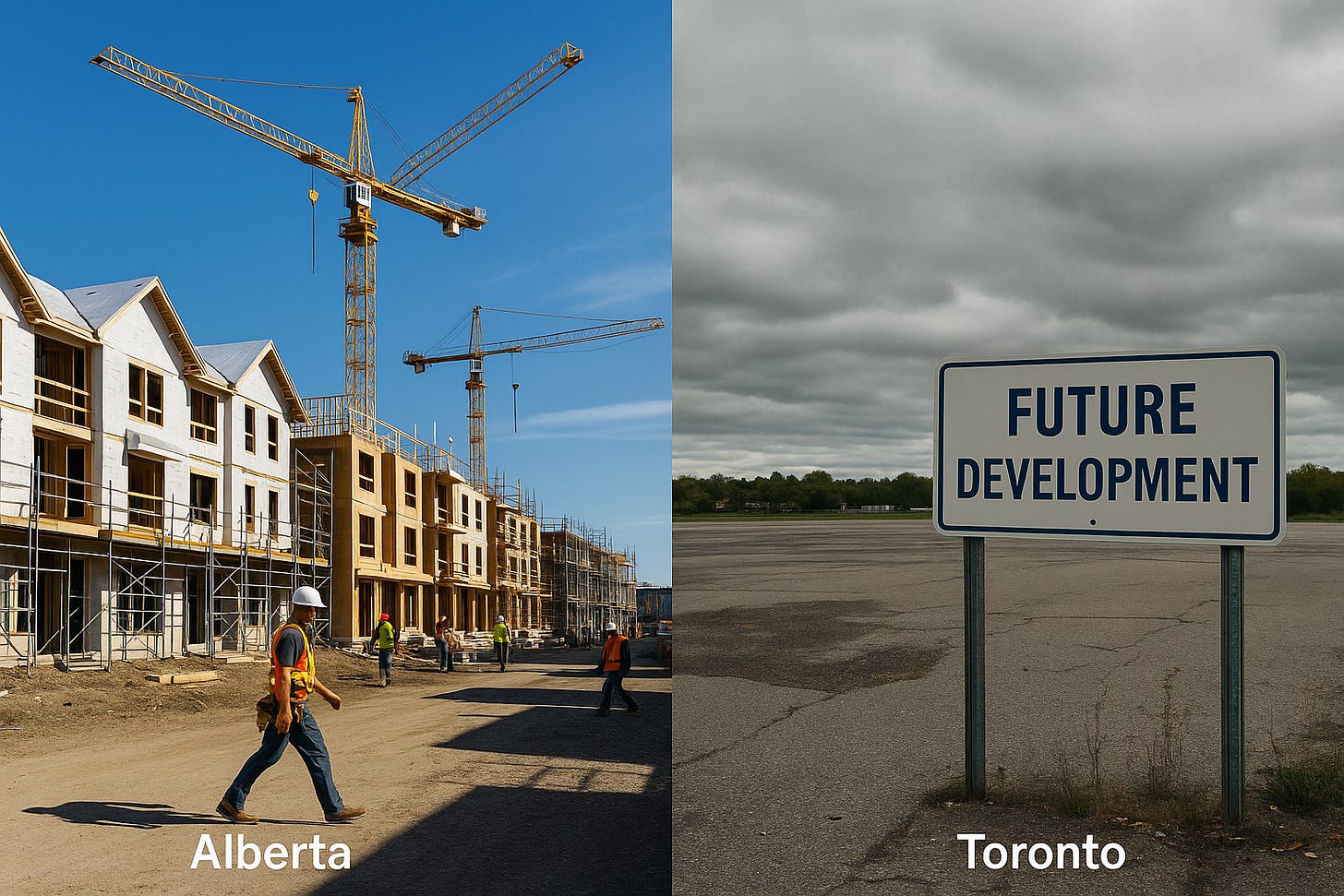The economy of a serious country should make housing available for its residents
For the past couple of years, we have been hearing about a housing crisis in Canada. The Trudeau Liberals ignored it because it showed that their 2014-15 promises were bogus. They blamed everything, including Russia, COVID, supply chains, and inflation, but never themselves. Then the crisis deepened when the voters turned away from the Liberals, and announcement after announcement promised more and better housing. Trudeau was ousted, and his successor borrowed from Trudeau’s playbook, making more announcements and more promises.

After that, you would think that the federal and provincial governments would be making sure that there are more dwellings, right? No. Not at all. Talk is cheap. Most governments in Canada view problems as public relations crises that need to be managed. It’s about messaging. For as long as they tell voters they are “delivering,” voters will believe they are “delivering,” while the problems persist or get worse. But reality does not change because politicians say so.
The Fraser Institute’s op‑ed “Alberta sets pace in new housing construction; rest of Canada should catch up” tells an uncomfortable story for Canada: Alberta leads, Ottawa dithers. While housing availability collapses across the country, Alberta outpaced everyone in per‑capita housing starts in 2022, showing that purposeful policy—not announcements, policy statements and performative summits—solves problems.
Fraser Institute’s Warning: Supply Can’t Keep Pace
The Fraser Institute’s study offers a sobering picture of a country unable to house its own people. The study notes that Canada’s population exploded in 2023 and 2024, adding more than two million residents over those two years, but the pace of new home construction failed to keep up. In 2024 alone, fewer than 250,000 new homes were started across the country, a number far outstripped by the nearly one million new residents added that same year. The imbalance pushed the ratio of new residents per housing start to its highest point in decades, almost double the historical average, further deepening the affordability crisis.
Against this backdrop, Alberta’s performance is remarkable. The province recorded more than 46,000 new housing starts in 2024, a leap of roughly one‑third over the prior year, with Edmonton and Calgary leading the charge. In the first half of 2025, Alberta’s pace quickened further, with housing starts up nearly 30 per cent year over year. The Fraser Institute observes that without Alberta’s surge, national figures for housing starts would have actually declined.
While Alberta’s housing starts surged nearly 30 percent in the first half of 2025—adding 27,902 new homes and enough to prevent Canada’s overall numbers from declining—the rest of the country stumbled badly. Ontario, the largest province, averaged just 86,650 housing starts annually between 2022 and 2024, far short of its stated target of 150,000 per year and insufficient to keep pace with its swelling population; in 2025 alone, Ontario saw a sharp slump of –24.8 percent in housing starts, while Toronto dropped by nearly 9,954 starts, more than wiping out Alberta’s gains (Fraser Institute, Fraser Institute). British Columbia also declined by 8.2 percent in the first half of 2025, with Vancouver down about –10.6 percent; elsewhere in the province, few regions offset urban stagnation (Fraser Institute). Quebec, meanwhile, remains in chronic crisis—not building enough units to keep up with its population growth, with affordability worsening and vacancy rates plunging to historic lows, driven by regulatory gridlock as detailed in housing analyses for the province.
To sum up, there is a housing crisis, and the BC, Ontario and Quebec economies are building even fewer dwellings than the previous year. That is some solution!
These data underscore a palpable reality: while Canada talks, Alberta shows that decisive local action—streamlined permitting, cutting through bureaucracy, and a healthy appetite for building—can deliver results. The Fraser report lays out the Canada problem; Alberta is demonstrating a solution.
Permitting reform. Fewer zoning choke points. A refusal to be bullied by urban NIMBYs. This is how Alberta got roofs built, while in the rest of the country, Ottawa continues to host ribbon‑cuttings for projects that don’t exist. In short, while Alberta ramped up housing starts by tens of thousands and held the national line, the rest of Canada was left trailing—bogged down by red tape, supply shortfalls and year-on-year decline.
The Choir of Naysayers
This has implications for the current national unity debate. Contrast the Alberta resolve and problem-solving ethic with the rest of the country. A country whose economy cannot provide housing for its residents is in trouble. Such a country lacks credibility and travels onward on a perilous road that leads to economic and social instability. Canada has been on that path for the last decade. Countries that struggle to house their people are typically considered third-rate. Second-rate countries at least provide poor-quality housing.
For all Alberta’s practical competence, a chorus of politicians and public figures insists Alberta could never make it alone, but one must wonder if it isn’t the opposite. Many Canadians, including many in Alberta, perhaps understandably, do not want Alberta to separate. But offering words and feelings isn’t enough. Certainly, insulting words that put Alberta down are even less helpful.
Prime Minister Mark Carney cautioned that Alberta’s separatist rumblings threaten national stability, pushing Ottawa to appease the province or risk “the very unity of the country.” Former NDP premier Rachel Notley dismissed Alberta’s sovereignty push as “a thoughtless legal collection of mumbo jumbo… creating economic uncertainty” when stability is needed most.
Naheed Nenshi, Alberta NDP leader, has not even understood that premier Smith is not a separatist, let alone understood that this is not a game: “No more playing stupid separatist games with the future of our province… I will be damned if we ever, ever let Danielle Smith tear the country down. Canada is worth fighting for.”
Thomas Lukaszuk, a less notorious school teacher than Justin Trudeau and the former deputy premier in the most corrupt government in Alberta’s history, echoed the vacuous loyalist line: “We should be strong and forceful in reaffirming our commitment to our country — to Canada… And those who don’t feel the affinity or loyalty to our country, they shouldn’t be the ones leading this debate.” He went on to say: “Separation will threaten the Canadian as well as the Alberta economy, the wealth of Albertans, the Canadian citizenship rights of Alberta residents, the treaty rights of our First Nations, and have many other serious and negative consequences.”
But What Does the Evidence Say?
Alberta is not Haiti or Venezuela! When critics claim Alberta would “flounder,” what do they offer besides dire hypotheticals? Alberta’s track record in housing says otherwise. The ability to cut through bureaucracy and deliver homes—on time, at scale—shows governance capacity, problem-solving, and the enterprising spirit that makes Alberta distinct from the rest of the country. Pair that with world-class energy assets, a strong autonomous ethic, a high GDP per capita, and a history of fiscal over‑contribution to Confederation, and the caricature of Alberta as some backwater province incapable of self-rule crumbles.
I am not suggesting that building homes is all it takes for Alberta to demonstrate its ability to stand on its own if it so chooses. But in this case, housing isn’t just homes; it’s evidence. Proof that Alberta can handle complex, multi-layered policy challenges better than the national government, and better than most provincial governments. If housing is a crisis, as Laurentians admit, their inability to tackle the crisis effectively speaks volumes. Their willingness to close Parliament for the summer while many Canadians can’t find a home – on top of so many other problems — doesn’t scream new administration. It’s precisely what the last cottage occupant in the PMO did.
The Takeaway
You may not want Alberta to be independent, and that’s okay. But every time an Ottawa-aligned politician scoffs that Alberta would fail alone, remember this: when the country needed homes, Alberta entrepreneurs built them. When the country needed decisive leadership, Alberta provided it.
Next time Nenshi says independence is a “stupid game,” ask him: which province is solving real problems? And which is giving speeches and flying rainbow flags, simply filling the air with promises of delivering? Ask what happened to the NDP in the last election?
Again, housing itself is an important aspect, but it isn’t the central issue. The issue is effective government, efficient economy, and the will and capacity to solve complex problems that will help build more prosperous communities. If Alberta can build houses for Canadians, why wouldn’t it be able to build a country for Albertans? Too simplistic? Turn the question around: Is a country that cannot provide housing for its people, despite acknowledging that it is a crisis, a country worth keeping? Is it a country worth staying in? Housing for people is much more important than pride parades, even if you believe such parades are great.
Well-meaning Laurentians should think about leading by example. They should consider building a Canada that Albertans and all Canadians, including the gullible “elbows-up” folks, would be proud to belong to. Woke radical politics, irresponsible fiscal policies, identitarian distractions, and fantasy pronouncements about delivering without practical solutions won’t cut it. What matters is what has always mattered: results!

